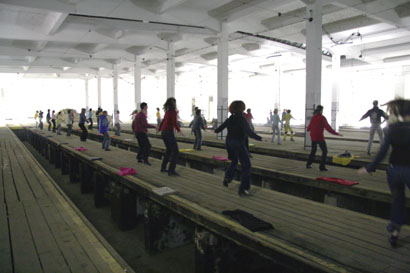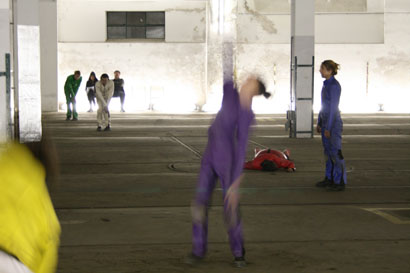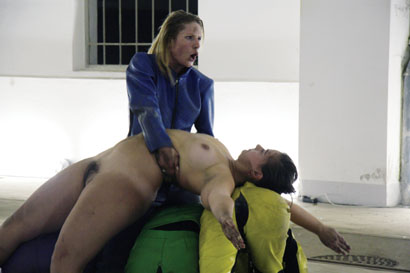theatercombinat | 17.10. - 14.11.2007 coriolan shakespeare – political rhetoric as weapon against uprising bodies, thepalace, vienna (a) |
|
press review |
shakespeare's political argument-play with a dancing mass-chorus and 6 actors in the halls of a former tram depot. battle, entertainment, tap dance. metal plates on concrete. the beginning of democracy in the upcoming roman republic. political rhetoric. by discourse of bodies and languages the space starts to oscillate and the different elements clash. shakespeare's tragedy "coriolanus" (1607/08) - a permanent collision of interests, political regimes, rules, rhetorics, imgages of state and bodies. city - streets - forum - capitol - camp - battlefield. plebeians, patricians, tribunes, senators. sodliers, officers, heroes. |
clip: alexander könig; trailer: 1st part; 2nd part video: CORIOLAN |
direction/concept: claudia bosse, coriolanus/volumnia: doris uhlich, aufidius/titus lartius/volumnia: marie-eve mathey-doret, menenius/volumnia: aurelia burckhardt, cominius/volumnia: gerald singer, brutus/adile/volumnia: christine standfest, sicinius/herold/volumnia: jennifer bonn, dramatugy: christine standfest, direction assistance: konstantin küspert, production/public relations: lena wicke, space intervention: karoline streeruwitz, christian teckert, consultancy space: jonni winter, translation: bosse/standfest, documentation, assistance space/production: anke dyes, research: andreas gölles, production assistance: brigitte luik, space assistance: victoria philipp, archive: tatjana gerlach, photography: konstantin küspert, maria mäser, video: frédéric lombard, sound: arnold haberl, musical consultancy: jennifer bonn, werner möbius, light consultancy: gerhard fischer, citizens: guido aengenheyster, monika bischof, anita broser, iwona brugger, eva cermak, michael de werd, anne decker, linde dröscher, sigrid eder, michaela fink, nada frauenhofer, renate gärtner-horvath, wiebke hebestedt, maria helm, julia jovanovic, roswitha kauer, brigitte kiss, christl kucera, andrea mayer, astrid mayer, rachel moser, isolde müller, ingrid müller, susa muzler, angela nagy, maria ohrfandl, manfred panis, mariella pauls, saskia pauls, ingrid pazdernik, maria theresia pichler, doris prammer, ingrid racz, ewa-maria rogal, thomas scheiber, kristina singer, luzia steindl, marie tappero, michaela wareka, carina zabini. thepalace – betriebsbahnhof breitensee, hütteldorferstraße 112, 1140 wien, premiere: 17.10.2007, 9 shows supported by wiener linien, wohnbauvereinigung für private angestellte, österreichisches siedlungswerk, magistrats-abteilung 33 der stadt wien. theatercombinat is supported by wien kultur. thanks to ing. thomas chalupsky, mag. dieter dorazin, johann hödl, dipl. ing. gerald parzer, johann polzer |
28 scenes, there of a dozen on battlefields, masses of extras, extensive employment of special effects. the play portrays the beginning of democracy in the upcoming roman republic. class struggle, hesitating masses. rome, city of plebeians and patricians. in this play from shakespeare, the people turns into an agent of history. the version of the text is inspired by the fragmentary translation of coriolan by j.m.r. lenz. the german parts of the text have been newly translated, other text passages are spoken according to the original english, interrupted by quotations from mao to agamben. 6 performers fill the wide open space and the ditches of the empty tram depot with rhythms, materializing the space via different movement codes and body images. metal plates on concrete. battle, entertainment, dirt, political rhetoric. the political system becomes a system of space: it is stretched between the three parties of the audience - plebeians againt patricians, romans against volscians. the spectators become part of the battles and the political power struggles. the mass chorus from turn terror into sport becomes an element of the performance. the insurgency of the street seizes the premises of thepalace. |
|
 |
"coriolanus" was written around 1600 in england during a time of food riots and rural exodus at the beginning of capitalism with its exploding urban culture. "coriolanus" juxtaposes in almost cinematic cuts dynamics of situations to "devour" the audience - situations of political relations which create speech - speech which invades the body, rapidly, directly - argument play, tragedy, spectacel. |
www.theatercombinat.com theatrale produktion und rezeption
 fotos: konstantin küspert
fotos: konstantin küspert